India's Semiconductor Ambitions: Chip Players Re-evaluate Investment Plans
By Rediff Money Desk, NEWDELHI Mar 03, 2024 12:49
India is attracting global semiconductor players to invest in the country. Minister Vaishnaw states that the focus has shifted from 'if and when' to 'how soon' regarding investments. India aims to become a major player in the global semiconductor market within the next 5 years.
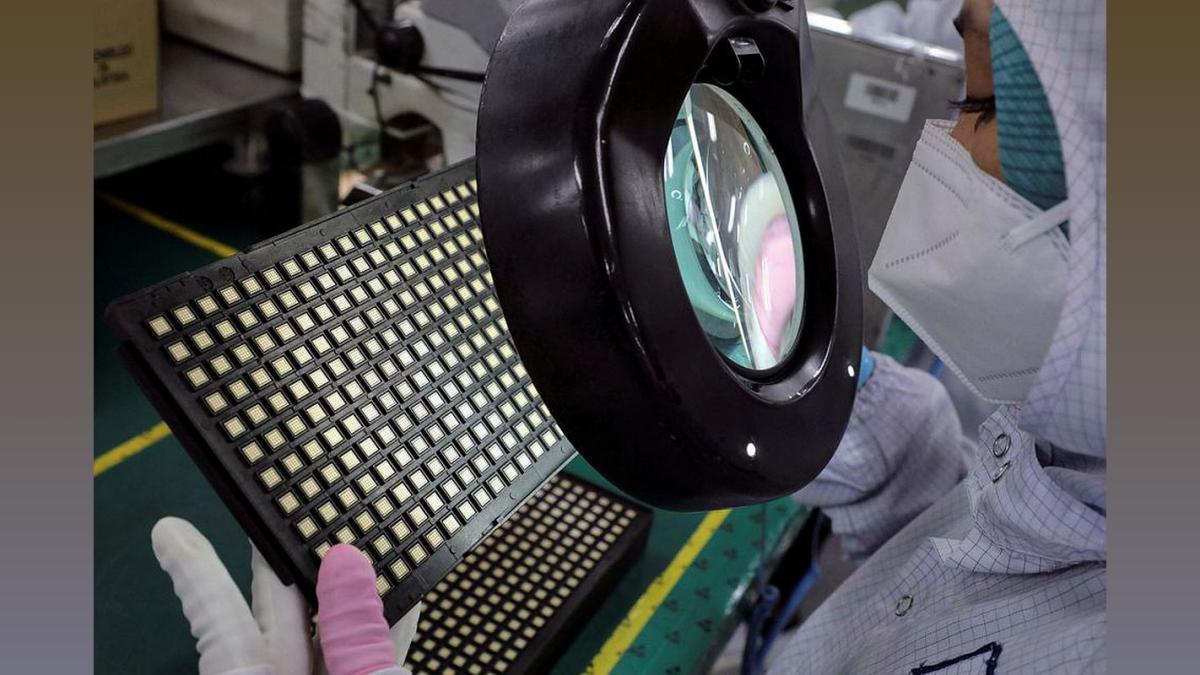
Photograph: Lim Huey Teng/Reuters
New Delhi, Mar 3 (PTI) India has set its sights on becoming a formidable force in global semiconductor equation, rivalling known destinations like Taiwan and South Korea in next 5 years, Union Minister Ashwini Vaishnaw has said asserting that if and when mindset of global players has changed to an eagerness to invest in the country.
In an interview to PTI, the minister for IT and electronics said he is of the firm belief that practically every big player would now like to reconsider their investment plans and come to India, given the carefully-crafted policies here.
India will build on its design capabilities, where the country already has inherent and proven mettle and, notably, nearly one-third of the global talent.
That piece alongside the proposed fab (chip fabrication plant) and the 3 ATMP (assembly and test) units in India now brings together the key elements of semiconductor value chain, effectively, according to him.
"...people who were earlier thinking when should we go to India or should we go to India...now they are asking how soon do we go to India...that is the change which is happening. This means, practically every big player would now like to reconsider their investment plans and come to India," he said.
Asked about the timelines when India would aim to be a formidable player rivalling known semiconductor destinations, the minister said, "in the coming 5 years, definitely".
The comments assume significance as semiconductors are emerging as a new frontier in the geopolitical battleground amid US-China tensions, and India has moved quickly to line up incentives that would position it as an attractive destination for global companies looking at alternatives to expand operations, and for domestic champions to take the plunge into this high-tech arena.
In fact, India's bold moves to line up enabling policies and sweeteners for semiconductor manufacturing has yielded the first commercial fab proposal.
This week, the government approved proposals to set up three semiconductor plants, including a mega fab by Tata Group, at a cumulative investment of Rs 1.26 lakh crore, as India moved to position itself as an international powerhouse in chip manufacturing.
"...it is very important for any developing country, an economy of our size, to have a semiconductor supply chain within the country. We have very strong design capabilities, as a corollary of design capabilities we must have the manufacturing capability also because that is where value gets added further," Vaishnaw explained.
The semiconductor plans will make India self-reliant, trigger a multiplier effect on economy and various industries, create job and spur livelihoods, according to the minister.
"The semiconductor industry is a big multiplier for many more industries -- automobiles, electric vehicle, electronics, power electronics, defence -- every manufacturing sector requires semiconductors. So having that as a semiconductor value chain within the ecosystem will be pull for all of these," Vaishnaw said.
As per the announcements, Tata Electronics Pvt Ltd will set up a semiconductor fab in partnership with Taiwan's Powerchip Semiconductor Manufacturing Corp at Dholera's special industrial region in Gujarat. The plant will have the capacity to produce 50,000 wafers per month and involve an investment of Rs 91,000 crore.
These chips driven by advanced technology will cater to multiple sectors -- power management chips for electric vehicles (EV), telecom, defence, automotive, consumer electronics, display, and power electronics.
The government has also approved a proposal by Tatas to build a greenfield semiconductor assembly and test facility in Jagiroad, Assam. The facility will be built with an investment outlay of Rs 27,000 crore and is expected to generate over 27,000 direct and indirect jobs in the region.
Notably, this will be India's first semiconductor unit in the northeast.
Tata Semiconductor Assembly and Test (TSAT) will develop indigenous advanced semiconductor packaging technologies, including flip chip and ISIP (integrated system in package) technologies, with a capacity of 48 million chips per day. The target segments for these would be automotive, electric vehicles, consumer electronics, telecom, and mobile phones, among others.
The third proposal that have received the Cabinet nod is by CG Power, which in partnership with Renesas Electronics Corp and Stars Microelectronics of Thailand, will set up a unit in Sanand in Gujarat at an investment of Rs 7,600 crore.
India is looking to woo global and domestic chip makers to establish production base in India with its multi billion dollar (USD 10 billion) incentive scheme.
Sophisticated chips are part of everyday life, used in mobile phones to refrigerators and cars to high-tech industries, and so fostering local industry with carefully-crafted schemes and incentives will link India to an ever-growing, thriving global chip market.
As it is, the global semiconductor shortage in the past has emphasised the importance of this critical component in modern day electronics.
Earlier, computer storage chip maker Micron has announced it will set up its semiconductor assembly and test plant in Gujarat, entailing a total investment of USD 2.75 billion (around Rs 22,540 crore).
In an interview to PTI, the minister for IT and electronics said he is of the firm belief that practically every big player would now like to reconsider their investment plans and come to India, given the carefully-crafted policies here.
India will build on its design capabilities, where the country already has inherent and proven mettle and, notably, nearly one-third of the global talent.
That piece alongside the proposed fab (chip fabrication plant) and the 3 ATMP (assembly and test) units in India now brings together the key elements of semiconductor value chain, effectively, according to him.
"...people who were earlier thinking when should we go to India or should we go to India...now they are asking how soon do we go to India...that is the change which is happening. This means, practically every big player would now like to reconsider their investment plans and come to India," he said.
Asked about the timelines when India would aim to be a formidable player rivalling known semiconductor destinations, the minister said, "in the coming 5 years, definitely".
The comments assume significance as semiconductors are emerging as a new frontier in the geopolitical battleground amid US-China tensions, and India has moved quickly to line up incentives that would position it as an attractive destination for global companies looking at alternatives to expand operations, and for domestic champions to take the plunge into this high-tech arena.
In fact, India's bold moves to line up enabling policies and sweeteners for semiconductor manufacturing has yielded the first commercial fab proposal.
This week, the government approved proposals to set up three semiconductor plants, including a mega fab by Tata Group, at a cumulative investment of Rs 1.26 lakh crore, as India moved to position itself as an international powerhouse in chip manufacturing.
"...it is very important for any developing country, an economy of our size, to have a semiconductor supply chain within the country. We have very strong design capabilities, as a corollary of design capabilities we must have the manufacturing capability also because that is where value gets added further," Vaishnaw explained.
The semiconductor plans will make India self-reliant, trigger a multiplier effect on economy and various industries, create job and spur livelihoods, according to the minister.
"The semiconductor industry is a big multiplier for many more industries -- automobiles, electric vehicle, electronics, power electronics, defence -- every manufacturing sector requires semiconductors. So having that as a semiconductor value chain within the ecosystem will be pull for all of these," Vaishnaw said.
As per the announcements, Tata Electronics Pvt Ltd will set up a semiconductor fab in partnership with Taiwan's Powerchip Semiconductor Manufacturing Corp at Dholera's special industrial region in Gujarat. The plant will have the capacity to produce 50,000 wafers per month and involve an investment of Rs 91,000 crore.
These chips driven by advanced technology will cater to multiple sectors -- power management chips for electric vehicles (EV), telecom, defence, automotive, consumer electronics, display, and power electronics.
The government has also approved a proposal by Tatas to build a greenfield semiconductor assembly and test facility in Jagiroad, Assam. The facility will be built with an investment outlay of Rs 27,000 crore and is expected to generate over 27,000 direct and indirect jobs in the region.
Notably, this will be India's first semiconductor unit in the northeast.
Tata Semiconductor Assembly and Test (TSAT) will develop indigenous advanced semiconductor packaging technologies, including flip chip and ISIP (integrated system in package) technologies, with a capacity of 48 million chips per day. The target segments for these would be automotive, electric vehicles, consumer electronics, telecom, and mobile phones, among others.
The third proposal that have received the Cabinet nod is by CG Power, which in partnership with Renesas Electronics Corp and Stars Microelectronics of Thailand, will set up a unit in Sanand in Gujarat at an investment of Rs 7,600 crore.
India is looking to woo global and domestic chip makers to establish production base in India with its multi billion dollar (USD 10 billion) incentive scheme.
Sophisticated chips are part of everyday life, used in mobile phones to refrigerators and cars to high-tech industries, and so fostering local industry with carefully-crafted schemes and incentives will link India to an ever-growing, thriving global chip market.
As it is, the global semiconductor shortage in the past has emphasised the importance of this critical component in modern day electronics.
Earlier, computer storage chip maker Micron has announced it will set up its semiconductor assembly and test plant in Gujarat, entailing a total investment of USD 2.75 billion (around Rs 22,540 crore).
DISCLAIMER - This article is from a syndicated feed. The original source is responsible for accuracy, views & content ownership. Views expressed may not reflect those of rediff.com India Limited.
You May Like To Read
TODAY'S MOST TRADED COMPANIES
- Company Name
- Price
- Volume
- Vodafone Idea L
- 7.46 ( -2.74)
- 31957353
- Srestha Finvest
- 0.70 (+ 2.94)
- 30864239
- Suzlon Energy Ltd.
- 54.59 ( -8.08)
- 25413562
- GTL Infrastructure
- 2.03 ( -3.79)
- 12427517
- AvanceTechnologies
- 0.92 ( -3.16)
- 10181645
MORE NEWS

Silver Prices Surge on Spot Demand - PTI
Silver prices jumped by Rs 633 to Rs 89,960 per kilogram on the Multi Commodity...

LTIMindtree Expands US Presence with Houston...
LTIMindtree opens new facility in Houston, focusing on AI, digital transformation, and...

Swiggy CEO: Expecting Solid Growth in Next 3-5...
Swiggy CEO Sriharsha Majety expects strong growth in the next 3-5 years, driven by...



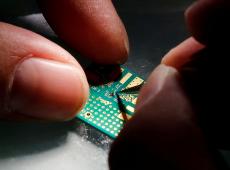
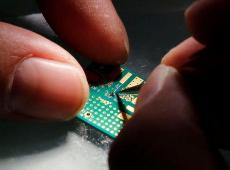

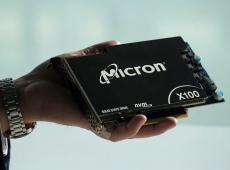

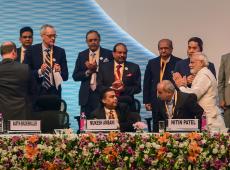

 © 2024 Rediff.com India Limited. All rights reserved.
© 2024 Rediff.com India Limited. All rights reserved.